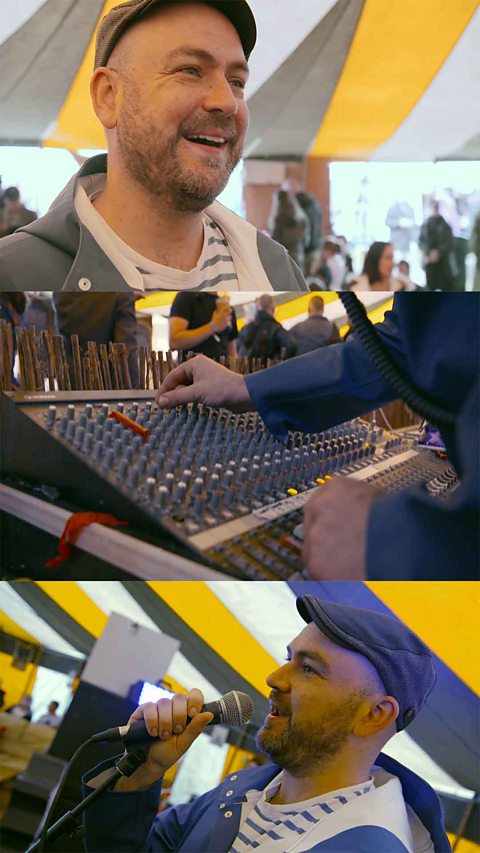Meet Pete and find out more about life as a stage manager. Part of our Bitesize world of work series.
In this role, a typical day would be to see who I've got on stage. Get there nice and early. Make sure I've got everything that I'm going to need for all my acts and make sure they don't overrun - that's the big one.
Subject-wise at school, I'll be honest, I didn't do music and I wasn't great academically. I was doing enough music outside of school. I think if you really want, if you want to do something like that, like really wan't to do it, you just do it and you just hope that the opportunities come. You can make the opportunities happen to a degree, if you're so driven, but I definitely spend a lot more time performing than I do managing the stages. That kind of opened up this entire industry, because I've done it for a long time, so that's probably why I was picked to do the role really.
This industry seems very glamorous. A lot of people want to do this kind of work, so you've got to be driven and you've got to appreciate it is going to be long hours. It's not always going to be fun. I'm not paid here to party. I'm paid here to make sure that things run smoothly, so a lot of people think it's a free gig ticket, but not if you're serious about doing this as a career, it's not a free gig ticket.
You've got to have the right personality for it. You've got to be friendly, you've got to be able to tell people that it is time to get off when they want to overrun, but do it friendly if you can, or just turn the power off, if you're a coward.
I think if you really want do something like that, like really wan't to do it, you just do it and you just hope that the opportunities come.

Pete’s main job is as a touring musician. He plays drums and other instruments for artists. His background as a musician opened up opportunities for him in stage management. As he knows the stage from a performance point of view, he was asked to stage manage and has recently worked at Bluedot Festival
A typical day involves him getting there early to see who’s going to be on stage and making sure he has everything he needs for the acts
He is the son of two musicians and always wanted to be a musician himself. Although he didn’t study Music at school, he focused on playing instruments in his spare time. When exploring career choices at school, a career in music didn’t even come up as an option
Pete says a lot of people want to work in stage management and it can sometimes be seen as a glamorous industry or a free gig ticket, but it's actually hard work. You need to be driven and be prepared to work long hours. You also need to be friendly and be able to tell people when it’s time to get off the stage, so that the acts don’t overrun.


What to expect if you want to be a stage manager
- Stage manager average salary: £18,000 to £48,000
- Stage manager typical working hours: 39 to 41 hours per week. You could work evenings, weekends and bank holidays.
What qualifications do you need to be a stage manager?
You could get into this role via a university course, a college course, an apprenticeship or working towards this role.
Sources: LMI for All, National Careers Service
This information is a guide and is constantly changing. Please check the National Careers Service website for the latest information and all the qualifications needed.
For careers advice in all parts of the UK visit: National Careers Service (England), nidirect (Northern Ireland), My World of Work (Scotland) and Careers Wales (Wales).

Work experience in your area
Find work experience placements with Workfinder.
Tips and advice
Help with interviews, writing a CV and all things work experience related.

Raphael: sound engineer. video
Raphael works with artists including Stormzy, Hamzaa and Tinie Tempah.

Jobs at music festivals and in the music industry
Find out about people working in the music industry and at festivals like BBC Radio 1's Big Weekend, Glastonbury and Blue Dot festival.

Jade Bird: Singer-songwriter. video
Jade Bird talks about her journey into the music industry.
